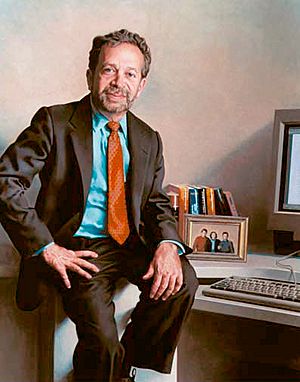Robert Reich facts for kids
Quick facts for kids
Robert Reich
|
|
|---|---|

Official portrait, 1993
|
|
| 22nd United States Secretary of Labor | |
| In office January 20, 1993 – January 20, 1997 |
|
| President | Bill Clinton |
| Preceded by | Lynn Morley Martin |
| Succeeded by | Alexis Herman |
| Personal details | |
| Born |
Robert Bernard Reich
June 24, 1946 Scranton, Pennsylvania, U.S. |
| Political party | Democratic |
| Spouses |
Clare Dalton
(m. 1973; div. 2012)Perian Flaherty |
| Children | 2, including Sam |
| Education | Dartmouth College (BA) University College, Oxford (MA) Yale University (JD) |
| Awards | The VIZE 97 Prize (2003) |
| YouTube information | |
| Years active | 2015–present |
| Subscribers | 1.12 million |
| Total views | 134.6 million |
| Subscriber and view counts updated as of February 2025. | |
Robert Bernard Reich (![]() i/ˈraɪʃ/; born June 24, 1946) is an American professor, writer, and lawyer. He also shares his ideas as a political commentator. He worked for Presidents Gerald Ford and Jimmy Carter. He was the Secretary of Labor for President Bill Clinton from 1993 to 1997. He also advised President Barack Obama on economic matters.
i/ˈraɪʃ/; born June 24, 1946) is an American professor, writer, and lawyer. He also shares his ideas as a political commentator. He worked for Presidents Gerald Ford and Jimmy Carter. He was the Secretary of Labor for President Bill Clinton from 1993 to 1997. He also advised President Barack Obama on economic matters.
Since 2006, Reich has been a professor at the Goldman School of Public Policy at UC Berkeley. Before that, he taught at Harvard University and Brandeis University. In 2008, Time magazine called him one of the ten best cabinet members of the century. The Wall Street Journal also listed him as one of the most influential business thinkers.
Reich has written many popular books. These include The Work of Nations (1991) and Saving Capitalism (2015). He also made films with Jacob Kornbluth. Their film Inequality for All won an award at the 2013 Sundance Film Festival. He is involved with the group Common Cause and writes a blog at Robertreich.org.
Contents
Robert Reich's Early Life and Education
Reich was born in Scranton, Pennsylvania. His family was Jewish. His father owned a clothing store. As a teenager, he was diagnosed with a condition called multiple epiphyseal dysplasia. This condition made him shorter than average.
Because of his height, Reich was sometimes bullied. He found protection from older boys. One of them was Michael Schwerner. Schwerner was later murdered in 1964 while helping African-Americans register to vote. Reich says this event inspired him to "fight the bullies" and "protect the powerless."
Reich attended John Jay High School. He earned a scholarship. In 1968, he graduated from Dartmouth College with a history degree. He then won a Rhodes Scholarship to study at University College, Oxford. There, he met Bill Clinton for the first time.
Reich was drafted for the Vietnam War. However, he did not pass the physical exam because of his height. He is 4 feet 11 inches (1.50 meters) tall. The minimum height was 5 feet (1.52 meters). He earned his master's degree from Oxford in 1970. Later, he earned a law degree from Yale Law School. At Yale, he was classmates with Bill Clinton and Hillary Clinton.
From 1973 to 1976, Reich worked for judges and lawyers in the government. In 1977, President Jimmy Carter appointed him to a role at the Federal Trade Commission. From 1980 to 1992, Reich taught at Harvard University. During this time, he wrote several books and articles.
Serving as Secretary of Labor
Bill Clinton used Reich's ideas in his 1992 presidential campaign. After Clinton won, he asked Reich to lead economic policy for his new team.
Reich became the United States Secretary of Labor. On January 21, 1993, his appointment was approved by everyone. He was seen as a very powerful member of Clinton's team. This was because he was friends with the President. He also had big plans for the Department of Labor.
Reich wanted the Labor Department to work closely with other agencies. These included the Commerce and Education departments. He believed they could work together to solve problems. He also wanted more government spending on job training and improving roads and bridges.
Reich also advised President Clinton on many other topics. These included health care, education, and technology. He called himself the "secretary of the American work force." He also said he was the "central banker of the nation's greatest resource."
However, Reich disagreed with others in the administration. Some wanted to focus only on reducing the national debt. This put Reich's plans for economic growth on hold. During his time, he helped put the Family and Medical Leave Act (FMLA) into action. He also helped raise the national minimum wage.
NAFTA and Trade Debates
Reich was a strong supporter of the North American Free Trade Agreement (NAFTA). This agreement was first discussed by the previous administration. President Clinton supported it after adding agreements for workers and the environment. Reich was a main speaker for the Clinton administration. He argued against labor unions who opposed NAFTA.
In 1993, Reich said that unions were wrong to think NAFTA would cause job losses in America. He believed it would create more jobs in the U.S. than it would lose to Mexico. He also said that free trade after World War II led to a big increase in jobs and living standards.
Reich explained that big changes need people to be flexible. They need to adapt quickly and learn new skills. He said that opposition to NAFTA was more about people's worries about economic changes. He personally spoke to members of Congress to support the agreement. NAFTA passed and became law in December 1993.
Years later, Reich changed his mind about similar trade deals. He said he regretted not doing more to strengthen NAFTA's worker and environmental protections.
Returning to Influence
By 1994, Reich's ideas were less central to the administration. But after the Democratic Party lost many seats in the 1994 elections, Reich became important again. President Clinton then focused on some of Reich's ideas. These included tax cuts for the middle class and raising the minimum wage.
Reich also called for cutting government money given to corporations. He called this "corporate welfare." He said this was the only way to pay for job training programs. He also agreed that some federal job training programs did not work. He wanted to keep the good ones and get rid of the bad ones.
In 1995, Reich proposed banning government contractors from permanently replacing striking workers. President Clinton agreed with Reich. This showed Reich's important role in the administration's economic plans.
Reich often gave speeches about the new "information-based" economy. He stressed the need for workers to get new training. He said, "We can't get the mass production economy back. The challenge now is of a different kind." He also spoke about the "anxious class" of Americans. These were people worried about global competition and technology.
After His Time in Government
In 1996, Reich decided to leave the Department of Labor. He wanted to spend more time with his sons.
In 1997, he published a book about his time in the Clinton administration. It was called Locked in the Cabinet. In the book, he shared his experiences. He also criticized some people and ideas. He said the Democratic Party was "owned by" businesses. He also said Washington had two main political groups: the "Save the Jobs" party and the "Let 'Em Drown" party.
After the book came out, some people criticized it. They said some of the conversations in the book were made up. Reich later changed or removed these parts in the paperback version. He explained that "memory is fallible."
Teaching and Public Work
After leaving the government, Reich became a professor at Brandeis University in 1997. Students there voted him Professor of the Year in 2003.
In 2006, Reich joined UC Berkeley as a professor. He teaches popular courses on wealth and poverty. He is also on the board of the Blum Center for Developing Economies. This center works to solve extreme poverty and disease around the world.
Running for Governor
In 2002, Reich ran for Governor of Massachusetts. He lost in the Democratic primary election. He also wrote a book about his campaign called I'll Be Short. Reich was the first candidate for governor to support same-sex marriage. He also was against the death penalty. Even with little money, he finished second in the primary.
In 2005, some thought Reich would run for governor again. Instead, he supported Deval Patrick. Patrick later won the election in 2006.
Sharing His Views
In 2004, Reich published Reason: Why Liberals Will Win the Battle for America.
He also wrote weekly for the radio program Marketplace. He was a regular writer for The American Prospect magazine, which he helped start. He also appeared on TV shows like Kudlow & Company.
Since 2016, he has written opinion columns for Newsweek magazine.
In 2013, he made the documentary Inequality for All with filmmaker Jacob Kornbluth. This film was based on Reich's book Aftershock. It won an award at the Sundance Film Festival. In 2017, they made another documentary called Saving Capitalism. This film was chosen by Netflix. In the film, Reich talks about how large companies gained political power. He suggests that everyday people need to get involved to balance this power.
In 2022, Reich appeared in an episode of The Simpsons. He briefly explained the economic decline of the American middle class.
Since 2021, Reich has written a daily newsletter called Robert Reich. He shares his thoughts on economic and political issues. Over one million people subscribe to it.
Robert Reich's Political Views
In 2008, Reich explained his views on wealth. He said he doesn't believe in taking wealth from some to give to others just for the sake of it. But he is concerned about how the nation can pay for what it needs. He believes taxes should pay for things that make society safe and productive.
Reich supports expanding the Earned income tax credit. This is a wage supplement for lower-income people. He suggests paying for it with higher taxes on the wealthiest people. He also believes in investing in education for lower-income communities. This includes early childhood education and better access to college.
Reich is very supportive of unions. He says that unions are good for workers and the economy. In 2014, he said he favors raising the federal minimum wage to $15 per hour. He believes this would not hurt big businesses. He thinks it would also lead to more valuable workers.
Reich also supports a universal basic income. This is a regular payment to everyone, no matter their income. He said in 2016 that countries will eventually need to use this idea.
Reich has spoken out against settlement building in the Palestinian territories. He has also spoken about the conflict in Gaza. He believes the U.S. should limit arms sales to Israel.
In 2008, Reich supported Barack Obama for President. In 2016, he supported Bernie Sanders. He also supported Sanders and Elizabeth Warren in 2020. After Sanders ended his 2016 campaign, Reich encouraged his supporters to back Hillary Clinton.
In 2020, Reich said that Donald Trump had failed to respond to major crises in America. Since 2021, Reich has supported removing Donald Trump from social media platforms. In 2022, he criticized Elon Musk's efforts to take over Twitter. He called the idea of an "uncontrolled" internet "dangerous."
In 2022, Reich called Florida Governor Ron DeSantis a "fascist." In 2023, he praised President Joe Biden. He called Biden "shrewd, careful, and calibrated."
Robert Reich's Personal Life
Reich married Clare Dalton in 1973. They divorced in 2012. They have two sons. One son, Sam Reich, is the CEO of Dropout. Their other son, Adam, is a sociology professor. Robert Reich later married Perian Flaherty.
Reich was born with multiple epiphyseal dysplasia, a form of dwarfism. He is 4 feet 11 inches tall. He wrote a blog post in 2023 explaining his height.
In 2020, Reich wrote letters to a city commission in Berkeley. He objected to building new housing units near his home.
In 2023, Reich made a cameo appearance in a show called Breaking News. He played a fictional version of his son Sam's life.
Awards and Recognition
- Bruno-Kreisky Award, for best political book of year (Supercapitalism), 2009
- Václav Havel Foundation VIZE 97 Prize, October 2003, for his writings in economics and politics.
- Louis Brownlow Award (best book on public administration), National Academy of Public Administration, 1984
Robert Reich's Books
- 1982: Minding America's Business: The Decline and Rise of the American Economy (with Ira Magaziner)
- 1983: The Next American Frontier
- 1985: New Deals: The Chrysler Revival and the American System (with John Donahue)
- 1987: Tales of a New America: The Anxious Liberal's Guide to the Future
- 1989: The Resurgent Liberal: And Other Unfashionable Prophecies
- 1990: The Power of Public Ideas (editor)
- 1990: Public Management in a Democratic Society
- 1991: The Work of Nations: Preparing Ourselves for 21st Century Capitalism
- 1997: Locked in the Cabinet
- 2000: The Future of Success: Working and Living in the New Economy
- 2002: I'll Be Short: Essentials for a Decent Working Society
- 2004: Reason: Why Liberals Will Win the Battle for America
- 2007: Supercapitalism: The Transformation of Business, Democracy, and Everyday Life
- 2010: Aftershock: The Next Economy and America's Future (updated edition 2013)
- 2012: Beyond Outrage: What Has Gone Wrong with Our Economy and Our Democracy, and How to Fix It
- 2015: Saving Capitalism: For the Many, Not the Few
- 2017: Economics in Wonderland
- 2018: The Common Good
- 2020: The System: Who Rigged It, How We Fix It
Robert Reich's Plays
- Milton and Augusto (reading, University of California Berkeley, Center for Latin American Studies, September 2013)
- Public Exposure (East Coast premier, Wellfleet Harbor Actor's Theater, June 2005; West Coast premier, Santa Rosa Theater, June 2008)
Robert Reich's Films
These documentaries were made with Jacob Kornbluth.
- 2013: Inequality for All
- 2017: Saving Capitalism
- 2025: The Last Class
See also
 In Spanish: Robert Reich para niños
In Spanish: Robert Reich para niños
- 2008–09 Keynesian resurgence
- Journal of Women, Politics & Policy – Reich is on the editorial board
- The Trap (TV series), BBC documentary featuring Reich
- List of Jewish United States Cabinet members
 | May Edward Chinn |
 | Rebecca Cole |
 | Alexa Canady |
 | Dorothy Lavinia Brown |




